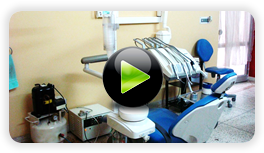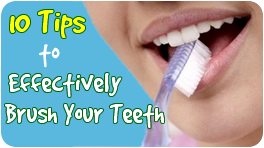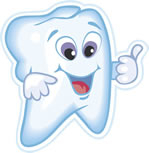 The teeth and mouth are vulnerable to many diseases, and there’s a lot that can go wrong which can cause ill health and deterioration of the teeth.
The teeth and mouth are vulnerable to many diseases, and there’s a lot that can go wrong which can cause ill health and deterioration of the teeth.
Symptoms such as bleeding or painful gums or teeth, bad breath (halitosis), bad taste or loosening of the teeth require intensive cleaning and aggressive oral hygiene measures by your dentist to prevent premature loss of teeth.
Vulnerable groups
- Extra care is needed with children’s teeth to make sure they grow up with strong healthy dentition.
- But the elderly, pregnant women, those with learning difficulties or physical disabilities and others with special health problems also need to take special care.
Lifestyle
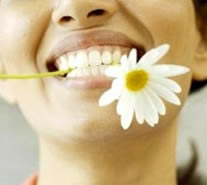 Important lifestyle factors that will help keep teeth and gums healthy include a well-balanced diet and avoiding tobacco and too much alcohol.
Important lifestyle factors that will help keep teeth and gums healthy include a well-balanced diet and avoiding tobacco and too much alcohol.- Our teeth may be damaged by a substance called plaque that forms on them – the amount of plaque is consistent with the amount of starchy, sugary foods that are consumed – so the more starchy, sugary foods consumed, the more that plaque is produced.
- Plaque is formed by the normal bacteria that live in our mouths.
- These bacteria thrive on sugary food that coats the teeth if not regularly cleaned off.
- As the bacteria grow, they produce a white film around the area of the teeth that border the gums. This is plaque, and it contains acid produced by the bacteria, which damages the enamel surface of the tooth and causes decay.
- Refined sugar is the worst for the teeth because it’s so readily digested by oral bacteria, causing a surge of acid on the teeth.
- Sugars from fruit and starch, however, may be less harmful.
- Snacking provides a constant source of nourishment for the oral bacteria, and so may be bad for the teeth, especially if the snacks are sugary.
- Eating should be confined as much as possible to meal times. However, hard fibrous foods like apples have a mechanical cleaning effect on the teeth and some foods like cheese or sugar-free chewing gum can protect against decay because they raise the alkalinity and stimulate saliva.
- Fizzy drinks are acidic and also cause erosion of the enamel surface of the teeth.
- Children should only be allowed fizzy drinks as an occasional treat.
- Ideally, they should be given a straw as this delivers the drink to the back of the mouth and throat, rather than letting it pool around the teeth.
- Fizzy drinks should never be put in a baby or toddler’s bottle because the sweet acidic drink may then bathe the teeth for long periods.
- Fruit drinks, such as orange juice, may also be sugary and acidic and can lead to dental problems in the same way – children should be encouraged to drink water.
- Vitamins, calcium and iron are important for oral health, so meat and dairy products are important along with all the other aspects of a healthy balanced diet.
- Tobacco, well known to promote oral cancer, can lead to gum inflammation and too much alcohol is also bad for oral health and linked to mouth and throat cancer.
Benefits of good oral hygiene
-
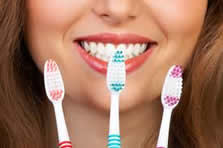 A clean mouth helps prevent dental disease.
A clean mouth helps prevent dental disease. - No matter how good your diet and lifestyle, sticky plaque accumulates on everyone’s teeth promoting gum disease.
- As gums recede, more plaque builds up and gum disease worsens.
- Careful brushing of the teeth twice a day with a fluoride toothpaste helps to keep plaque under control and will enable the tooth to mend itself after being attacked with plaque acids.
- Teeth can also be eroded or dissolved away, if you have acidic food and drink too often.
- Rinsing the acids away with water after eating helps to prevent this erosion.
Brushing teeth properly
-
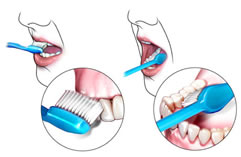 Ideally, everyone should brush their teeth twice a day with a soft-medium brush and a fluoride toothpaste. The brush should be replaced when bristles become out of shape.
Ideally, everyone should brush their teeth twice a day with a soft-medium brush and a fluoride toothpaste. The brush should be replaced when bristles become out of shape. - The bristles should be placed between the teeth and gums, and brushed pointing towards the gums using short circular movements.
- Every tooth should be brushed around making sure the brush can be felt on the gums, on the outer and inner sides of the teeth.
- A gentle scrub is better than using too much force and as small children cannot brush properly until they are about seven or eight, brush their teeth yourself and teach them the technique properly.
- An electric toothbrush is best because it is more efficient and many people don’t brush for long enough with a manual brush.
Flossing
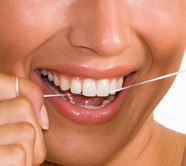 Dental floss helps clean out small particles of food and plaque lodged between the teeth and should be used every evening.
Dental floss helps clean out small particles of food and plaque lodged between the teeth and should be used every evening.- If your dentist or hygienist has told you that you need to floss, they will almost certainly show you how to do it. You will probably need to practise in front of a mirror.
- Use a piece of floss about eight inches long. Wrap the ends around the middle fingers of each hand leaving two to three inches between the first finger and thumb.
- Then gently slide the floss between two teeth and put it round one tooth next to the gum using your fingers.
- The floss is then moved between the teeth several times. This is then repeated for every tooth.
- Children do not need to use floss.
Fluoride
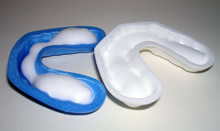 Fluoride is a naturally occurring mineral that is effective in protecting teeth against decay.
Fluoride is a naturally occurring mineral that is effective in protecting teeth against decay.- When teeth first start to decay, minerals in saliva help mend the teeth, but the mending process requires fluoride to work properly.
- In a few areas of Britain fluoride is found in the water supply, but most people need to get it from toothpaste.
- Most packs will tell you how many parts per million of fluoride the toothpaste contains, measured in ppm – 500ppm is a low level, 1000 to1500ppm is a high level.
- A low dose toothpaste should be used for children under seven because it is important to avoid too much fluoride while permanent teeth are still forming as it can mark the teeth.
- Therefore, help children up to the age of seven clean their teeth, use the right sort of paste, avoid them swallowing toothpaste and use only a pea-sized blob on their brush.
- Extra fluoride tablets or drops are usually only recommended for people with very bad decay or who have an illness that makes it particularly important to avoid dental problems.
Prevention is the key
- As the years go by the teeth and gums come under attack and decay and erosion of teeth is, to some extent, inevitable.
- But the process can largely be prevented or avoided altogether by regular attention to oral hygiene.
- A few minutes every day can save unpleasant, unattractive and unhealthy consequences in future years.


